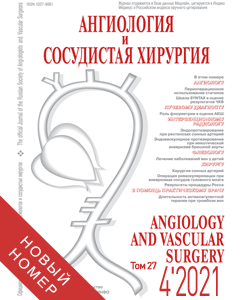Journal «Angiology and Vascular Surgery» •
1999 • VOLUME 5 • №2
APPROACHES TO PREVENTION OF CARDIAC COMPLICATIONS IN RESECTIONS OF ABDOMINAL AORTIC ANEURYSMS
P.O. Kazanchyan, V.A. Popov, V.M. Mizikov
Department of Vascular Surgery, Department of Anesthesiology,
M.F. Vladimirsky Moscow Regional Research Clinical Institute,
Moscow, Russia
Analysis of different risk factors of the development of postoperative cardiac complications was carried out in 116 patients with abdominal aortic aneurysms. A study was made of the predictive value of the clinical data, the results of preoperative functional examination (transesophageal pacing in conjunction with stress echocardiography), and of the data of intraoperative monitoring of central hemodynamics. Statistical analysis revealed a high predictive value in the development of cardiac complications of the following factors: history of myocardial infarction (relative risk 10.5), functional classes III and IV angina pectoris (relative risk 11.6), history of episodes of heart failure (relative risk 6.7), occurrence of the new areas of contractility impairment (relative risk 14.8), ST segment depression (relative risk 6,4) at tranesophageal pacing (TEP), a greater than 30% lowering of the mean AP at the moment of blood flow restoration in the aorta ((relative risk 7.5), a greater than 15 mm Hg rise of pulmonary wedge pressure (relative risk 11.6), emergence of new rhythm disorders (relative risk 6.7), and a greater than 2 mm St segment depression at operation (relative risk 7.6), Analysis of the causes of cardiac complications permitted to work out a complex of preventive measures including pre- and intraoperative procedures. Preoperative cardiologic and functional examination as well as the monitoring of central hemodynamics with appropriate correction of disorders enabled the number of postoperative complications to be reduced 2.5-fold (from 20.5 to 7.9%) during 5 years.
P. 63-78
ARCHIVES MAGAZINE
2021 (Vol.27)
2020 (Vol.26)
2019 (Vol.25)
2018 (Vol.24)
2017 (Vol.23)
2016 (Vol.22)
2015 (Vol.21)
2014 (Vol.20)
2013 (Vol.19)
2012 (Vol.18)
2011 (Vol.17)
2010 (Vol.16)
2009 (Vol.15)
2008 (Vol.14)
2007 (Vol.13)
2006 (Vol.12)
2005 (Vol.11)
2004 (Vol.10)
2001 (Vol.7)
2000 (Vol.6)
1999 (Vol.5)
1998 (Vol.4)
1997 (Vol.3)


